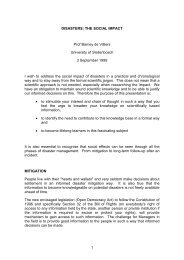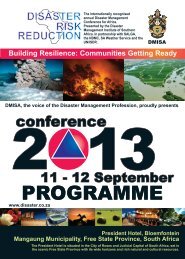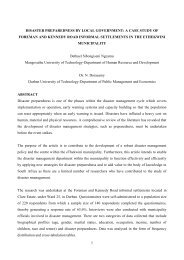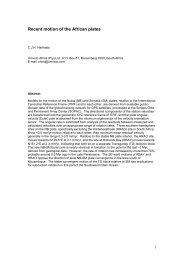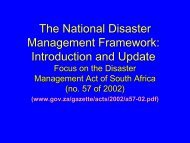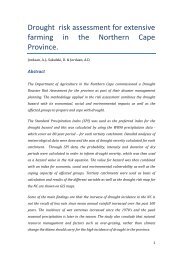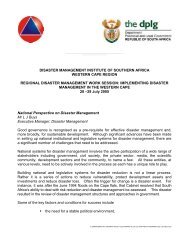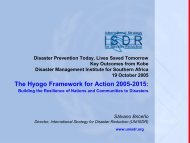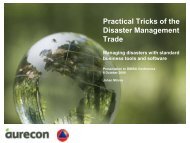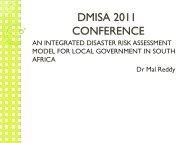MEDIA ALERT - Disaster Management Institute South Africa
MEDIA ALERT - Disaster Management Institute South Africa
MEDIA ALERT - Disaster Management Institute South Africa
You also want an ePaper? Increase the reach of your titles
YUMPU automatically turns print PDFs into web optimized ePapers that Google loves.
The <strong>South</strong> <strong>Africa</strong>n National <strong>Disaster</strong> <strong>Management</strong> Centre has introduced Phase 2 of the International<br />
Strategy for <strong>Disaster</strong> Reduction Campaign theme for 2010-2015: “Making Cities (Municipalities)<br />
Resilient: My City (Municipality) Is Getting Ready” (to implement DRR) at the DMISA Conference<br />
2012. The campaign strategy is that it should aim at creating an enabling environment of risk<br />
reduction at local level through the following strategic approaches:<br />
<br />
<br />
<br />
Political dimension: to attain commitments at local and national level to reduce disaster risk in<br />
a sustainable way by increasing investments within existing development programmes and<br />
budgets.<br />
Technical dimension: to facilitate the implementation of disaster risk reduction measures in<br />
municipal planning and implementation (i.e. through IDPs, compliance with building codes,<br />
etc).<br />
Communications/Advocacy dimension: to enhance awareness about disaster risk among<br />
different stakeholders, including local leaders, communities and other role players.<br />
The Campaign Partners and Target Audience:<br />
Primary audience:<br />
• Municipal structures: A Municipal planning process should be participatory, allowing all<br />
stakeholders to consider how best to integrate disaster risk reduction elements and the ‘ten<br />
essentials’ into their development plans and activities.<br />
(http://www.unisdr.org/campaign/resilientcities/toolkit/essentials)<br />
• Communities, civil society formations, Non-Governmental Organizations/Community Based<br />
Organizations, Faith Based Organizations can play a major role through “community action<br />
planning”. The importance of participative, community-based approaches is generally<br />
acknowledged in the fields of development, disaster preparedness, mitigation, response and<br />
recovery measures.<br />
Secondary audience:<br />
• National and provincial government:<br />
o<br />
o<br />
o<br />
To develop appropriate policies and legislative frameworks.<br />
To build adequate capacity and allocate resources.<br />
To involve non-state actors to support implementation.<br />
• Academic institutions:<br />
o<br />
o<br />
o<br />
o<br />
To design and implement DRM/R education and training programmes.<br />
Awareness creation on DRM/R issues.<br />
Development and roll-out of advocacy, awareness and research programmes.<br />
Knowledge management and advisory services (i.e. information and advisory services).<br />
• DRM professional bodies such as DMISA<br />
PROGRAMME HIGHLIGHTS<br />
OPENING CEREMON Y<br />
Candle ceremony and moment of silent reflection<br />
DR MAL REDDY: PRESIDENT: DMISA



